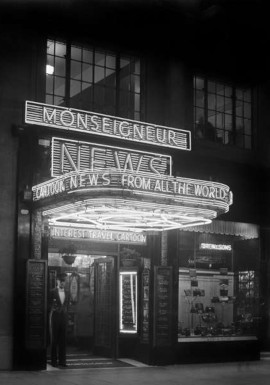Irene Letchet (IL-95-207) and Bernard Letchet (BL-95-207)

Photograph taken Jan 1939 © Historic England Archive ref: bb87/03863
Early in 1995, Irene Letchet heard about Cinema Culture in 1930s Britain through a local social group and contacted the project office with an offer of assistance. With her husband, Bernard, she eventually joined CCINTB's eighteen core informants based in and around the London suburb of Harrow, and the couple were interviewed at their home in North Harrow on 21 July and 23 November 1995. In August 2002 extracts from the Letchets' interviews featured in BBC Radio 4's 'Woman's Hour'.
Mrs Letchet was born in Islington in 1923: her father worked at the Post Office all his life, starting out as a mail sorter and rising to Chief Inspector; her mother was a dressmaker before marriage. On leaving school at sixteen Mrs Letchet took a job as a railway clerk, and during WWII served in the Wrens (Women's Royal Naval Service). She met her future husband during the war, and later trained as a teacher and worked in a primary school until her retirement. Mr Letchet was born in Finchley in 1926, his father an accountant and his mother a housewife. He left school at seventeen and worked briefly at Foyles Bookshop before entering a lifelong career in accountancy.
In their wide-ranging first interview, the Letchets talk about their earliest memories of going to the pictures, of Saturday morning cinema, of the joys of continuous programming ("This is where we came in"), and about the prevalence of the cinemagoing habit when they were young. They vividly recall the number and the different types of cinema in London's West End as well as those in and around their own area, remarking on the luxury and comfort afforded above all by the new supercinemas of the 1930s and on the feeling of uplift a cinema visit could deliver. They mention by name some fifty film personalities, including--unusually among our informants-- several Hollywood bit part players who popped up repeatedly in the same sort of roles. They pore over contemporary press reports of the 1937 grand opening of the Harrow Granada. They mention Hollywood stars' immaculate clothes and makeup; Fred Astaire's perfectionism and "not a Pavarotti" voice; and the studios' exploitation of juvenile stars like Shirley Temple, Deanna Durbin and Judy Garland. Naming over forty films, they recall in particular the 'scary' Disney feature animations Snow White and Fantasia and the hype surrounding their first release.
In their second interview, the couple, now conversing more between themselves and prompting each other's memories, revisit many of the themes and details arising in the earlier interview. The question of the qualities of the films and stars they liked is pursued further--lightheartedness, entertainment value, sophistication, and frivolity are mentioned, along with portrayals of life in the USA--a world they considered entirely apart from their own, to be admired from afar rather than aspired to. They did not expect high art from films--"You just went for the story"--and again stress the importance of cinema in people's daily lives at the time. They talk about seeing film and television stars in the flesh, about collecting autographs, and about British films and stars like Robert Donat ("a bit of a wimp") and Jessie Matthews ("cut-glass accent"). Moving on from the 1930s, they talk about going to the pictures during WW2--the blackout, carrying gas masks, the pervading anxiety ("We were just sort of waiting to be killed"), and about Mr Letchet's disappointing postwar visit to Hollywood: "All my life I wanted to see Hollywood Boulevard and I've been so disappointed. It's so scruffy."
Interview transcript | Listing of cinemas, films and stars mentioned
Audio-synced interview (2 of 2)
Interview transcript | Listing of cinemas, films and stars mentioned
Documents, Memorabilia and Related Links
Harrow home pageScan of Tarzan Questionnaire (BL-95-207TQ001)
Granada Theatre, Harrow (cinematreasures.org site)
Clipping of opening of the Granada Theatre (CM-20-001RP001)
Extract from 'The Ghost Goes West' (1935) (YouTube)
Feathery Gown dance scene from 'Top Hat', 1935 (YouTube)
Publication relating to material in the Letchets' interview:
Kuhn, A. (2009). ‘Film Stars in 1930s Britain: A Case Study in Modernity and Femininity’, in Tytti Soila (ed.), Stellar Encounters: Stardom in Popular European Cinema. John Libbey.